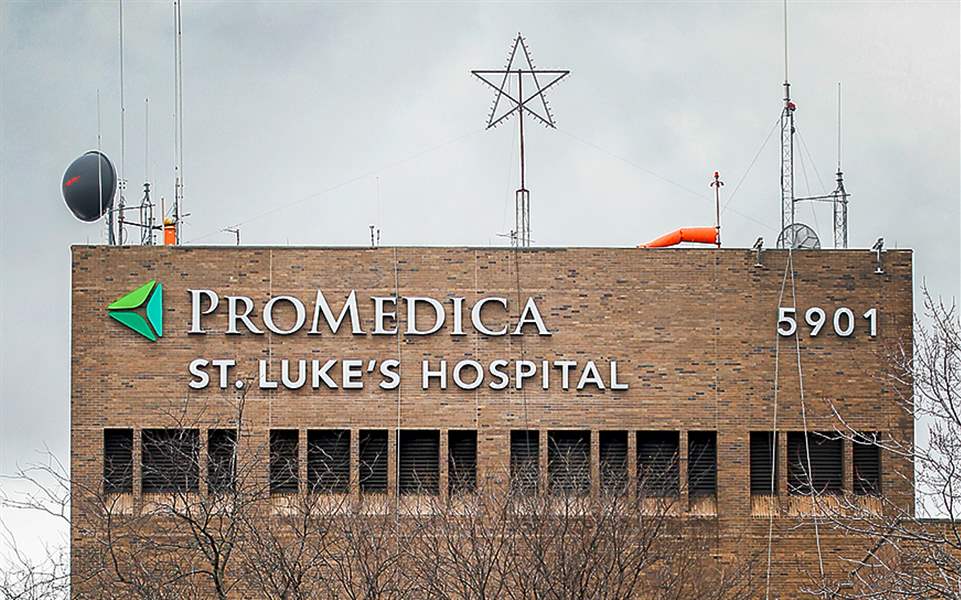
ProMedica ordered to drop St. Luke's
Court declares merger anti-competitive
4/22/2014
A financially struggling St. Luke’s Hospital in Maumee opted to join ProMedica in 2010. Regulators began looking into the deal and in 2011 the FTC ordered ProMedica to divest itself of St. Luke’s.
The Blade/Jeremy Wadsworth
Buy This Image

A financially struggling St. Luke’s Hospital in Maumee opted to join ProMedica in 2010. Regulators began looking into the deal and in 2011 the FTC ordered ProMedica to divest itself of St. Luke’s.
ProMedica officials said they are prepared to go to the U.S. Supreme Court, if necessary, to appeal a court order to divest itself of St. Luke’s Hospital in Maumee.
In a unanimous opinion on Tuesday, a three-judge panel of the U.S. 6th Circuit Court of Appeals in Cincinnati denied ProMedica’s petition to overturn a Federal Trade Commission ruling issued in 2011 that said it would be illegal and anti-competitive for ProMedica to merge with St. Luke’s.
READ: Judge's ruling on ProMedica St. Luke's merger
Circuit Judge Raymond M. Kethledge asserted in the ruling that ProMedica’s merger with St. Luke’s gives the hospital system too much bargaining clout when it comes to setting reimbursement rates with major health-care insurance companies.
“The 6th Circuit’s decision affirming the commission's ruling is a victory for the residents of Lucas County, Ohio, and ensures that they will continue to benefit from competition,” FTC chairman Edith Ramirez said in a written statement.
ProMedica leaders, however, expressed disappointment in the ruling and said they intend to appeal.
“As we continue this legal journey, we would like to emphasize that St. Luke’s Hospital remains a member of ProMedica, continues to serve patients, and all health plans currently accepted at St. Luke’s will continue to be accepted,” ProMedica said in a written statement.
When interviewed by The Blade two years ago about the court battle, Jeffrey Kuhn, ProMedica’s chief legal officer and general counsel, said the 6th Circuit Court’s decision would be final. But in an interview Tuesday, he said the legal landscape has changed and the Supreme Court has considered other cases involving hospital mergers.
“Back then we didn’t consider the possibility of going to the Supreme Court, but now we want to consider all of our options,” Mr. Kuhn said.
ProMedica has the option of petitioning for rehearing at the U.S. 6th Circuit Court of Appeals, said anti-trust expert Dan Crane, a law professor at the University of Michigan who is not involved with the case.
He said this initial case was considered by a three-judge panel and ProMedica could petition the court asking for a review by the full appellate panel of 15 justices.
If the request is denied, or if ProMedica loses that appeal, the hospital system still would have the option of asking the Supreme Court to hear the case.
“Most of the time petitions for rehearing are denied, so it would be unusual for it to be granted,” he said.
The appellate court and FTC are concerned that in Lucas County there are four main hospitals and by merging the largest with the smallest, it will create less competition and enable ProMedica to drive up costs, Mr. Crane said.
According to court documents, ProMedica — before the merger — already was the “dominant” health-care system in Lucas County with 46.8 percent of the market and St. Luke’s, which was an independent, nonprofit hospital, had 11.5 percent of the market.
It’s clear from the ruling that market share and the cost of health care in the Toledo area were the main drivers of the court’s decision.
“The record already shows a strong correlation between ProMedica’s prices — i.e., its ability to impose unilateral price increases — and its market share. Before the merger, ProMedica’s share of the [general acute-care] market was 46.8 percent, followed by Mercy with 28.7 percent, UTMC with 13 percent, and St. Luke’s with 11.5 percent. And ProMedica’s prices were on average 32 percent higher than Mercy’s, 51 percent higher than UTMC's, and 74 percent higher than St. Luke’s,” the court ruling stated.
“Thus, in this market, the higher the provider’s market share, the higher its prices. In ProMedica’s case, that fact is not explained by the quality of ProMedica’s services or by its underlying costs. Instead, ProMedica’s prices — already among the highest in the state — are explained by bargaining power,” the ruling continued.
Judge Kethledge said in the ruling that “the merger would result in a tremendous increase in concentration in a market that already was highly concentrated and the merger would make ProMedica dominate in southwest Lucas County.”
A financially struggling St. Luke’s opted to join ProMedica in 2010, and regulators began looking into the partnership shortly after that point. Then in December, 2011, the FTC ordered ProMedica to divest itself of St. Luke’s.
During the court battle over the ensuing years, ProMedica and St. Luke’s were prohibited by a court order from becoming full partners. ProMedica, for example, has been unable to change staffing levels or clinical services at St. Luke’s without FTC approval.
Contact Marlene Harris-Taylor mtaylor@theblade.com or 419-724-6091.